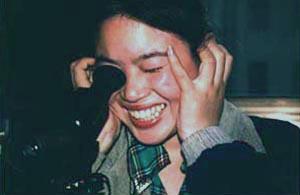-
In this paper we wish to explore the possibilities of using video in ethnographic research, and of video and other image-based media as a format for the presentation of research findings. We will be sharing with you some of the ideas and questions that emerged during and after fieldwork in China in 1995, in which video played a central role. Originally, this paper was presented at a seminar, in conjunction with slides and video excerpts. Here, we have included seven video clips, which can be accessed by clicking on the framed photos. We have also experimented with a combination of the written word and photographs.[1]
-
The fieldwork on which the paper is based related to a study of women in rural-urban migration, focussing specifically on the floating population in the city of Hangzhou. Large scale migration of rural residents to towns and cities has been a key feature of the development of a market economy in China in the 1980s and 1990s.
-
Most of these people are temporary or transient migrants, termed the 'floating population'. Their legal registration remains in their original residence, to which they commonly return after a few years. The floating population currently numbers some 100 million. In Hangzhou, a large proportion are young women, working in the silk and textile mills, or as waitresses, nannies, street-sweepers or prostitutes. They are the shock troops of capitalist development, taking on the jobs that urbanites shun.
-
Prejudice against the floating population is strong amongst urbanites. There is a tendency for migrants to be seen by urban citizens as a vast and unkempt horde of ignorant outsiders who pour 'blindly' into the cities, bringing dirt, disorder and crime. In this discourse there is little regard for the great degree of variation in origins, social status, motivation and behaviour amongst members of the floating population. It is the image of the beggar and the petty criminal that dominates. As summed up by the sociologist Yu Depeng, 'regardless of whether it is the conversation of ordinary urbanites or the opinions of important government officials that one is listening to, regardless of whether one is watching a popular film or television programme or reading the work of an authoritative expert,
|
one will be given more or less the same description of rural people who enter urban areas: that is, that they are, in the main, stupid, dirty, lacking in breeding, and without any sense of shame.
You will be told that the country people pouring into the cities are, if not active, then latent, robbers and plunderers, prostitutes and pimps, 'out-of-plan guerrillas' (a reference to those who do not conform to family planning policies) and carriers and transmitters of contagious diseases.'[2]
|
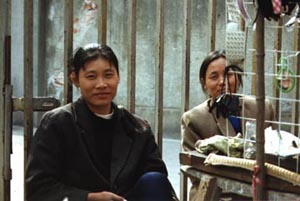
|
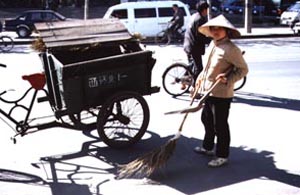
|
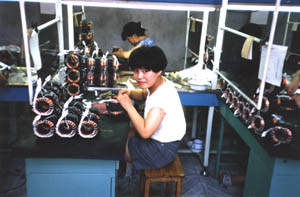
|
-
Against this background, our project set out to explore ways by which the experiences of rural women migrants themselves might be understood; the effects their migration has on their identity and status, and how they construct their identities and represent themselves in relation to other migrants, rural residents and urbanites. We considered that video recording, with its rich semiosis, would assist us in this task. Consequently, as part of the project, we spent about a month in October 1995, interviewing and filming with some twenty rural women working in Hangzhou.
|
Tamara conducted the interviews in Chinese, whilst Josko acted as camera person. Most of the interviews were conducted either in a quiet room at the women's workplace or at the guesthouse where we were staying, and on almost all occasions there was no one else present. The interviews lasted between one and two hours, during which time we encouraged the women to tell us about their lives, and especially their experiences in the city, with minimal intervention or questions from ourselves. We interviewed some of the women more than once and we also spent informal time with them. Others, including all those quoted in this text, we spoke with only once. Aside from these interviews, we filmed some twenty hours of footage around Hangzhou, including encounters with a range of people on the street.
|
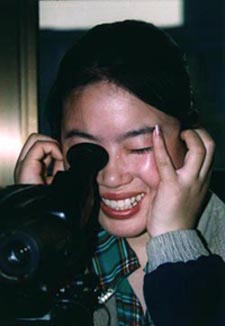
|

|

|
-
Video is an extremely efficient mode of recording and presenting research, and now that the technology is no longer as bulky and cumbersome as it used to be, it is likely to be taken up by more and more social science researchers. In our case, we used a small, super VHS camera, sometimes with, and sometimes without a tripod. These cameras are relatively cheap, small and inconspicuous, yet produce good quality images. In shape and size they are almost identical to the thousands of video cameras carried across the world by ordinary tourists. For researchers this similarity is a valuable asset in a place like China, where there is some concern that officials might restrict filming on the street or railway stations. At no stage did we encounter this problem. Needless to say we obtained permission to film from all our informants.
-
We would like to present our work, in part as a way of illustrating the possibilities for ethnographers and other social scientists of using video as a research tool. It must be pointed out though, that once a video recorder is introduced into the research process, it tends to take over. There are many reasons for this, some of which we will deal with later on. But for the moment, it may be sufficient to suggest that the use of video recording encourages, and even, to some extent forces, methodological and epistemological approaches very different to those taken in conventional ethnographic research.
-
It is the methodological and epistemological elements of our project on which we will focus in this presentation. But first we would like to provide you with some excerpts from interviews we conducted in Hangzhou.
(1): Interview with Taxi Driver, driving along Hangzhou Street.
Q: What do Hangzhou people generally think of these outsiders?
A: Nothing much. The most annoying thing is that they steal things.
Q: What's most annoying?
A: Before in Hangzhou bikes never got stolen. Now they're being stolen by the outsiders. It's all outsiders who do these bad things. The impression they leave with us locals is not so good.
|


|
(2): Interview with Worker, Mei Luxian, in Hangzhou No.1 Cotton Factory

|
|
My name is Mei Luxian and I'm 27. I'm from a mountain village in Lin'an County, not far from Hangzhou. I came here in November 1985. I've been here ten years. When I started working in this factory I was 17. I'd just finished school. Someone from the factory came to recruit workers. At that time I'd never been to Hangzhou. I hadn't been anywhere away from home. I thought Hangzhou would have to be a really good place. I very much wanted to go, so I registered my name.
|
(3): Interview with Rickshaw Driver in Hangzhou street.
Q: Are there many people coming in from the countryside?
A: Yes, there are a lot of peasant workers, surplus labour from the countryside. Near the railway station there's a lot. They're driving them out now. They leave a bad impression, don't they?
Q: What bad impression?
A: They make the city look bad. They lie around in the street, things all in a mess, all dirty. It looks bad, leaves a bad impression.
|
|
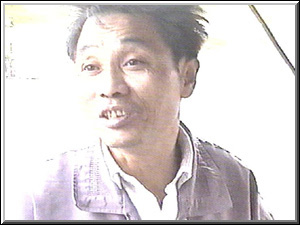
|
(4) Interview with Worker, Mei Luxian, in Hangzhou No. 1 Cotton Factory

|

|
I think the hardest thing to take is that Hangzhou people look down on us. They call us 'working sisters' and say we're nobodies. Nowadays not as many look down on us, but a few still do. 'Country bumpkin, country bumpkin', that's what they say. Our self respect takes a big blow. Sometimes they say a few words: 'You country bumpkins such and such....' Now that I've been here a few years and I'm older they don't say such things to me, but five years ago they were always saying it. 'You country bumpkins, what have you got to be proud of?' I'd try and argue with them and cry. Then I'd go back to the dormitory and cry some more. I've lived for the past ten years in a dormitory. I sleep in the top bunk. One dorm room holds five people. Life is hard. I'd say it's much tougher than for city people.
When my family came to see me in the dormitory they said, 'Oh, your conditions are so poor - four to five people in such a small room.' Of course the rooms are nothing like at home in the mountains. In the countryside the houses are all big. I must say that it's a bit boring now. I don't get a chance to go out. If I worked shifts I still couldn't go out. If I was working night shifts I'd be worried I wouldn't get enough sleep for the next shift. Things are tough. Being on the production line is very hard work. Even though some Japanese machines have been brought in, one person still has to run ten at once. That's very hard. Your'e always on the move, never still. If you want to go to the toilet you have to get someone to take over for you. There are no breaks. For people like us, life is tough. Work is tough. It has to be said that work in the production workshops is very tough. Speaking for myself, I feel very frustrated. If I'd stayed at home and succeeded at senior high school I could have got a better job.
I can be frank with you. I have a boyfriend from the same place as me. He's like me, also a temporary worker here. Now I'm rethinking things. We haven't yet married, even though we've been together four years, and now I'm not very happy about it. One problem is that we don't have a flat. If we got married we wouldn't have a flat because our household registration is elsewhere. He is also a wage-worker. His wages are only 500 yuan a month, so if the two of us got married we'd only have a thousand yuan a month. If, for example, we were to have a child, the costs would be very high. As far as kindergartens and schools are concerned, we're a 'black' household: we don't have household registration here, so we'd have to pay double to get our kid in. I feel lost. After having spent ten years at the Hangzhou cotton factory I myself feel that I'm a nobody. I've worked for so many years. I have lots of former classmates who've done something for themselves. They've graduated from college and been assigned a good job. So sometimes I really feel inferior. You could say that most of us 'working sisters' have a sense of inferiority. One problem is that we're not registered here. As far as Hangzhou people are concerned, they are the hosts and we are outsiders. In other words, we're just crashing their dinner party. It's so embarrassing.
When I first came I thought like a country girl. I thought I'd go back to where I'd come from. I always thought I'd go home one day. That's what I said five, no six, years ago. At most I'd work in Hangzhou for just a few years. Even if I got married, it would be back at home. That's how I thought. I was still a country girl. When the other girls escaped and went home, I felt I couldn't go back because I'd be laughed at, but I didn't feel good about it. I'm a country person, so naturally I wanted to go back. But now I think that even if they wanted me to, I wouldn't go back. I went home for a few months, but couldn't adapt. I've already got used to things here. In terms of food etc., of course things at home have improved. You could say it's not much different from the city now. All the same, I'd prefer to stay here. It's still more comfortable here.
|
-
As far as methodology goes there are a number of fairly straightforward points to be made. First of all, and at the simplest level, a video recording serves the same function as does an audio recording. It means that the researcher need not be hampered by having to take notes during the interview, and can go over what has been said at a later date. However, because visual cues and expressions are so
|
important in a conversation, a video recording is more appropriate than an audio recording in an interview context - if only because visual cues inform the spoken word. Thus, the visual images of Mei Luxian - the way in which she held herself, the way her eyes moved and the way she smiled, combined with the energy and intonations of her voice, reveal much about her personality and about the way in which she responded to the interview context. All this unspoken information has much bearing upon the content of what she was saying, and would be lost if only written notes or an audio recording had been taken, rather than a video of the interview. Secondly, video is not just a useful recording device; it also has distinct advantages as a way of presenting research. Video images presented on a screen come to the viewer directly as perception. Hence, they have an apparent immediacy and realism which is different from that apprehended in the 'interiority' of our thoughts when we read a book. Furthermore, as any advertising agent will explain, the combination of visual images and sound can often convey information, ideas and emotions much more quickly than the spoken word.
|
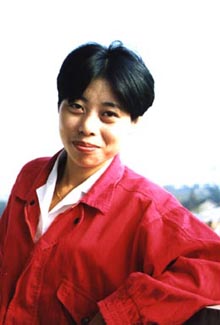
|
-
And, although there are many problems involved in this, an illusion can be conveyed with video, that the audience is seeing and listening to the voices of ordinary people from another culture, without this being manipulated or filtered through someone else's discourse, whether it be that of an official, an academic or whoever. This was particularly important in our project, because two key concerns were first of all, to understand the experiences of the women as individuals and from their own perspective, and secondly to enable our audience to identify and empathise with the women - to understand their desires and dilemmas as they would their own. A third point is that a video recording enables a greater degree of transparency about the actual research process, and hence validity, and it allows for direct discussion about the research process itself. A final point we would make here is that a video recording makes it possible to simultaneously present the speaking subject and the context so that the two inform one another.
-
To give an example, we will provide a brief extract of an introductory talk given to us by the deputy party secretary of the factory where the young woman you saw earlier, Mei Luxian, works. The woman in the background is the deputy secretary of the factory's youth league.
(5): Interview with Deputy Party Secretary, Hangzhou No.1 Cotton Factory

|
|
Many of you will be familiar with this kind of set up. Purely in terms of what the deputy secretary of the party said, this interview was of little interest to us. If presented on paper almost nothing beyond a few statistics about the factory could be gleaned. But recorded on video, this interview is very evocative. The combination of this pompous looking male official, with the young woman to the side looking bored out of her mind speaks a thousand words. In light of the fact that Mei Luxian talked to us just after this, in the same room, and with the deputy secretary of the factory's youth league sitting in the background, this also casts an interesting light on what Mei Luxian was saying, and the frankness with which she spoke to us.
|
-
Incidentally, the omission of a translation for this piece was quite deliberate. For all we have said about the apparent 'realism' of video, there is, of course, a high degree of manipulation and political decision making involved in any video production and presentation. In this case, there is a purpose behind not allowing a male party official to be heard, as it were, whilst giving free rein to an ordinary female peasant worker.
-
Much of what has been said thus far will be common knowledge to any conventional documentary film-maker. But we believe that for scholars, the issues related to the use of video in research go much further than this. It is necessary, for us as scholars, to do our best to understand and make others aware of the nature of the visual medium itself, the processes involved in its production, the ways in which it constructs knowledge, and how that knowledge will be used.
-
One point to which we would like to briefly draw your attention is that if the project is to produce a documentary video, rather than merely using video as a recording device, the concern must be not just with research, but also with presentation. And in such a presentation the aim is not just to convey a particular message, or meaning, but, perhaps even more importantly, to construct a visual effect. This shapes the decisions made, both while in the field filming, and when editing. For example, popular culture teaches us to expect drama at every stage of a visual presentation. In the field, the desire for drama means that some things are filmed and others not - and there is a tendency not to film the everyday, and to look instead for things that are unusual or exotic, especially if they involve conflict. This can lead to some difficult dilemmas. To give an example, we will provide an video excerpt as well as the translation text of a conversation that we had with a woman at the railway station.
(6): Interview with Woman at Hangzhou Railway Station

|
|
I am very unlucky, Auntie, and my husband is no good to me, so I went to Shanghai to work as a nanny. I worked there for two months. I lost all my money. I want to go home, but I'm afraid my husband would get angry at me, so I thought I'd go out on my own and earn some money, try to achieve my ideals.
|
-
If a documentary video was being made this may be considered a useful piece of footage. It is dramatic and poignant and it goes straight to the core of some of the issues we are addressing. It might well be said, though, that such footage exploits this woman for her misery, and that is certainly something that concerned us at the time. Furthermore, we are presenting an extreme picture of woman as victim. This was not the main impression that we wanted to convey of rural women workers. What was more important to us, was to convey our understanding that, whilst they face enormous difficulties, the women who have chosen to leave their village to work in the city - in effect moving into a strange and somewhat unwelcoming culture - are almost by definition, particularly enterprising and strong. We were also concerned to reduce the distance between the audience and the women portrayed - to emphasise the ordinariness, as it were, rather than to heighten the differences between 'us' and 'them'.
-
As a researcher thinking about presenting work in video form, the immediate question then becomes, do you tailor your work for general consumption, or do you force your audience to watch something that is boring but perhaps more nuanced and truer to the reality you want to portray? Taking these questions one step further, we believe that we must ask ourselves, as academics, whether we are working in a visual or any other medium, what is the purpose or value of our work, and whose interests does it serve? There is a risk of becoming so implicated in the workings of capital that the 'objects' of the research are exploited for the sole purpose of creating surplus value through dramatic effects. This concern is all the more pertinent now, given the increasing market pressures on academics and academic institutions.
-
None of the questions we raise here are new, and we have no better answers to them than does anyone else. In this context, though, it should be noted that our choice of informants is purposeful. Giving a voice to people, such as these women, who would otherwise be marginal or unheard, has always been politically important as a way of working against authoritarianism, and for a greater degree of democracy and understanding between people. But today it is perhaps even more important than ever before, as a way of counteracting the growing divides between people. We live in an age, supposedly, of greater and greater communication and interaction between peoples. Yet, across the world, increasing inequalities are resulting in tension and fear, and that in turn is resulting in the middle classes barricading themselves off, literally and metaphorically, from the poor - the outsiders who threaten crime, violence and chaos - whether they are the blacks in Los Angeles or the floating population in China.
-
One final question that we wish to raise here is that of performance. Any interview, it could be said, is an interaction between two or more people, and like all human interactions, it involves performance. This performance is shaped by the individual's understanding of the particular context in which she finds herself; an understanding which is in turn shaped by her history and culture. In the case of an interview in which the individual is facing a camera and being video-recorded, the question of performance becomes even more significant. In China today, as in Australia, the lives and aspirations of young people are influenced by television. Television in its various manifestations permeates everything in our cultures, so much so that it could be argued that television is no longer a cultural instrument as such, but like language, television through its various manifestations is culture itself. Nowadays, most of us know what it means to be on TV. We know how to be an audience, a witness, a performer and a voyeur. In this context we need to note that television has its own specific codes that are different from language qua language codes. For example body gestures, body language and performance of the body, are very important visual codes. Using video as a research tool not only foregrounds these performance codes in the recording process but invites the participants to perform them.
-
What is the significance of this? Does the fact that these women are performing for the camera mean that whatever findings we glean from the interviews are invalid? If we ignored the fact that information and knowledge is always contingent upon a specific set of relationships and a specific set of circumstances and we then proceeded to extract information from the interviews as if the fact that the women are performing was irrelevant, then yes, our findings probably would be invalid. If, however, we are prepared to take on board this principle of the contingency of knowledge, and to incorporate the issue of performance into our analysis, we might well find, not just that our findings have greater validity, but that our understanding is enriched.
-
Incorporating the issue of performance into an analysis of interviews with migrant women entails focussing on a new set of questions, namely, why do these women adopt these particular subject positions at this particular point in time, and how, through what historical processes and socialisation did they acquire them?
-
In this presentation, we wish to indicate two different ways in which these questions might be approached. First of all, we would like to explore the possible links between rural migrant women's performances, women's strategies for survival and resistance in pre-revolutionary China and the revolutionary practice of 'speaking bitterness' [su ku].[3]
-
In pre-revolutionary China, one of the few ways in which a woman could act against injustice or injury perpetrated upon her by her husband or in-laws was to go out into the laneway and scream her hurt for all the village to hear. A crowd would gather and listen to her complaints and affirm or contest her sense of injury. This public performance would have the desired effect of causing the husband to lose face, and sometimes other villagers would be further moved to intervene in the conflict on the woman's behalf.[4]
-
Ann Anagnost suggests that this public venting of rage, is an antecedent of the 'speak bitterness' sessions which were so important in the formation of a revolutionary consciousness amongst villagers in China in the period of class struggle and land reform. Through these 'speak bitterness' sessions, villagers, encouraged and guided by Communist Party officials, learnt to publicly voice their sufferings, not in terms of unlucky fate or personal shortcomings, but in terms of an unjust and oppressive feudal system. This was a way of educating people to think in terms of Marxian categories of class and exploitation, and of making them active and enthusiastic agents of revolution. This public venting of rage was later institutionalised further, in the rituals of the struggle session, which reached their height of prominence during the Cultural Revolution.
-
The significance of 'speaking bitterness' for Anagnost and other foreign researchers in the 1970s and early 80s was that it formed the underlying narrative, the 'script', if you like, to accounts given by interviewees of their lives, raising the question: 'Who is the speaking subject? Is it the subject who speaks, unproblematically, as the liberated consciousness of the silenced in history, or as poststructural theory would have it, is the narrative, somehow, 'speaking her'?'[5]
-
In the accounts of rural women workers in contemporary China we can see traces of 'speaking bitterness'. So many of them speak with bitterness and resentment about the ways in which they are looked down upon by urbanites, and the ways in which they are exploited and treated with contempt by their employers. Their discourse, indeed their consciousness of exploitation and injustice is learnt, to some extent, from the Maoist past. But whereas 'speaking bitterness' was once accepted, indeed cultivated by the state, these women's words now seem much more like the more traditional form of public voicing out against, and perhaps a calling to account of, a state and society that treats them with contempt. Thus, judging from their responses, it seemed that many of the women interviewed and filmed understood the process not only as an extraction of information from them, but also as a rare and welcome opportunity for them to tell their story; their version of history. And there was a sense in which we with our video cameras, like the journalists in Tian'anmen Square in 1989, were being called upon to be their witness.
-
Of course, the voicing of discontent is just one gloss on the performance of the migrant women with whom we spoke, but performances usually have complex histories and motivations, and can be read
|
in many different ways. In this case, it is probably true to say that for many participants the sheer fact that they were being filmed was also an important factor motivating their performances. Furthermore, given the centrality of television in contemporary popular culture in China, as elsewhere, it is highly likely that the narratives of the migrant women whom we interviewed, and even the patterns of their emotional responses and their gestures, contained elements picked up from television.
|
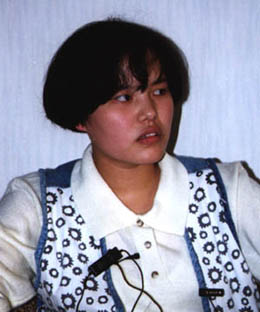
|
-
One interview in particular, alerted us to the potential significance of television culture. Li Qinqin is a twenty-one year old woman from Jiangxi, working in the same factory as Mei Luxian. She signed a three year contract with the factory which ends next year, at which time, she intends to return home. Unlike Mei Luxian, she was not very interested in the interview and her replies to our questions tended to be polite but minimal. That is until we asked about her hopes for the future. She told us she wanted to be a singer, and agreed to sing us a song. The song she chose is the theme song to a television drama that ran for forty episodes and was very popular in Hangzhou in 1995. The programme is called Dushi Fang Niu [Sending an Ox to Graze in the City], and one of the main characters is a young peasant man who has gone to the city to work, leaving behind the woman he has just married.
Translation
I want to know why you didn't even look at me again before you left
Maybe I shouldn't have poured out my feelings like that
Or you wouldn't have made such an unbearable choice
Ah, but you've gone anyway.
I don't want to sort out who is right and who is wrong
I don't want to know if it's me or you who's cold and who is warm
If I'd understood what you'd wanted
You might not have gone
Because I can't bear to be without your love.
(repeat)
Can you listen to me and let me finish
Don't leave me with a lifelong regret
I thought that our separation might set me free
It's only now I realize I'll be lonely for the rest of my life.
Ah, but you've gone anyway.
I don't want to sort out who is right and who is wrong
I don't want to know if it's me or you who's cold and who is warm
If I'd understood what you'd wanted
You might not have gone
Because I can't bear to be without your love.
(repeat)
You've gone anyway
Leaving me forever
With a dream that's lost its colour.
|


|
-
What is being recorded here? Is it the 'reality' of rural migrant workers' lives, or is it merely a re-run of a fiction already broadcast and watched by millions? Is there a difference? And how does Li Qinqin relate to this song of separation and loss, when it is she who has left her family in the village to seek work in the city? More generally, what role does television play in the construction of identities and social relations in contemporary China, and what effect does it have on the representation and self-representation of different groups in Chinese society? These are questions that we are only now beginning to examine, and which require a good deal more research.
Endnotes
[1]
A note from the HTML editor: as far as the video clips are concerned we were constrained by pragmatic considerations. To avoid taking up too much of your disk space and to limit downloading time, we have used the 'Real Player' option. In spite of the fact that some of the visual and audio clarity is lost, this seemed a better solution than downloading mpeg files - the longest of which would have taken over an hour!
[2]
Yu Depeng, 'Chengxiang guanxi zhong de "cheng che xiaoying"' ['The "riding the train effect" in relations between the city and the countryside'], Shehui (Society), No. 3, (1994): 38.
[3]
These issues are discussed in greater length in Tamara Jacka, 'Working Sisters Answer Back: Representation and Self-Representation in Women in China's Floating Population,' China Information, forthcoming.
[4]
Ann Anagnost, 'Who is speaking here? Discursive boundaries and representation in post-Mao China', in John Hay, (ed.), Boundaries in China, London: Reaktion Books, 1994, p.264.
[5]
Ann Anagnost, 'Who is speaking here? Discursive boundaries and representation in post-Mao China', in John Hay, (ed.), Boundaries in China, London, Reaktion Books, 1994, p 258.

|
